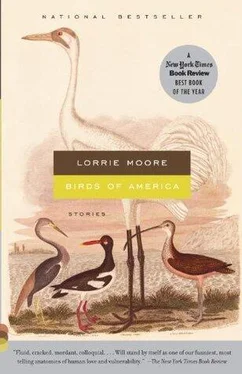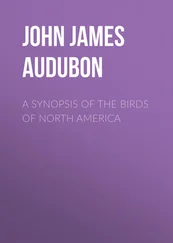Mack has moved so much in his life that every phone number he comes across seems to him to be one he’s had before. “I swear this used to be my number,” he says, putting the car into park and pointing at the guidebook: 923-7368. The built-in cadence of a phone number always hits him the same personal way: like something familiar but lost, something momentous yet insignificant — like an act of love with a girl he used to date.
“Just call,” says Quilty. They are off Route 55, at the first McDonald’s outside of Chicago. They are on a vacation, a road trip, a “pile stuff in and go” kind of thing. Quilty has been singing movie themes all afternoon, has gotten fixated on “To Sir with Love,” and he and Mack now seemed destined to make each other crazy: Mack passing buses too quickly while fumbling for more gum (chewing the sugar out fast, stick by stick), and Quilty, hunched over the glove compartment, in some purple-faced strain of emotion brought on by the line “Those schoolgirl days of telling tales and biting nails are gone.” “I would be a genius now,” Quilty has said three times already, “if only I’d memorized Shakespeare instead of Lulu.”
“If only,” says Mack. Mack himself would be a genius now if only he had been born a completely different person. But what could you do? He’d read in a magazine once that geniuses were born only to women over thirty; his own mother had been twenty-nine. Damn! So fucking close!
“Let’s just get a hotel reservation someplace and take a bath-oil bath,” Quilty says now. “And don’t dicker. You’re always burning up time trying to get a bargain.”
“That’s so wrong?”
Quilty grimaces. “I don’t like what comes after ‘dicker.’ ”
“What is that?”
Quilty sighs. “ Dickest . I mean, really: it’s not a contest!” Quilty turns to feel for Guapo, his Seeing Eye dog, a chocolate Lab too often left panting in the backseat of the car while they stop for coffee. “Good dog, good dog, yes.” A “bath-oil bath” is Quilty’s idea of how to end a good day as well as a bad. “Tomorrow, we’ll head south, along the Mississippi, then to New Orleans, and then back up to the ducks at the Peabody Hotel at the end. Does that sound okay?”
“If that’s what you want to do, fine,” says Mack.
They had met only two years ago at the Tapston, Indiana, Sobriety Society. Because he was new in town, recently up from some stupid quickie job painting high-voltage towers in the south of the state, and suddenly in need of a lawyer, Mack phoned Quilty the next day. “I was wondering if we could strike a deal,” Mack had said. “One old drunk to another.”
“Perhaps,” said Quilty. He may have been blind and a recovering drinker, but with the help of his secretary, Martha, he had worked up a decent legal practice and did not give his services away for free. Good barter, however, he liked. It made life easier for a blind man. He was, after all, a practical person. Beneath all his eccentricities, he possessed a streak of pragmatism so sharp and deep that others mistook it for sanity.
“I got myself into a predicament,” Mack explained. He told Quilty how difficult it was being a housepainter, new in town to boot, and how some of these damn finicky housewives could never be satisfied with what was true professional work, and how, well, he had a lawsuit on his hands. “I’m being sued for sloppy house painting, Mr. Stein. But the only way I can pay you is in more house painting. Do you have a house that needs painting?”
“Bad house painting as both the accusation and the retainer?” Quilty hooted. He loved a good hoot — it brought Guapo to his side. “That’s like telling me you’re wanted for counterfeiting but you can pay me in cash.”
“I’m sorry,” said Mack.
“It’s all right,” Quilty said. He took Mack’s case, got him out of it as best he could—“the greatest art in the world,” Quilty told the judge at the settlement hearing, “has been known to mumble at the edges”—then had Mack paint his house a clear, compensatory, cornflower blue. Or was it, suggested a neighbor, in certain streaky spots delphinium ? At lunchtime, Quilty came home from his office up the street and stopped in the driveway, Guapo heeled at his feet, Mack above them on the ladder humming some mournful Appalachian love song, or a jazzed-up version of “Taps.” Why “Taps”? “It’s the town we live in,” Mack would later explain, “and it’s the sound of your cane.”
Day is done. Gone the sun .
“How we doing there, Mack?” asked Quilty. His dark hair was long and bristly as rope, and he often pulled on it while speaking. “The neighbors tell me my bushes are all blue.”
“A little dripping couldn’t be avoided,” Mack said unhappily. He never used tarps, the way other painters did. He didn’t even own any.
“Well, doesn’t offend me,” said Quilty, tapping meaningfully at his sunglasses.
But afterward, painting the side dormer, Mack kept hearing Quilty inside, on the phone with a friend, snorting in a loud horselaugh: “Hey, what do I know? I have blue bushes!”
Or “I’m having the shrubs dyed blue: the nouveau riche — look out — will always be with you.”
When the house was almost finished, and oak leaves began to accumulate on the ground in gold-and-ruby piles the color of pears, and the evenings settled in quickly and disappeared into that long solvent that was the beginning of a winter night, Mack began to linger and stall — over coffee and tea, into dinner, then over coffee and tea again. He liked to watch Quilty move deftly about the kitchen, refusing Mack’s help, fixing simple things — pasta, peas, salads, bread and butter. Mack liked talking with him about the Sobriety Society meetings, swapping stories about those few great benders that sat in their memories like gorgeous songs and those others that had just plain wrecked their lives. He watched Quilty’s face as fatigue or fondness spilled and rippled across it. Quilty had been born blind and had never acquired the guise and camouflage of the sighted; his face remained unclenched, untrained, a clean canvas, transparent as a baby’s gas, clear to the bottom of him. In a face so unguarded and unguarding, one saw one’s own innocent self — and one sometimes recoiled.
But Mack found he could not go away — not entirely. Not really. He helped Quilty with his long hair, brushing it back for him and gathering it in a leather tie. He brought Quilty gifts lifted from secondhand stores downtown. A geography book in Braille. A sweater with a coffee stain on the arm — was that too mean? Cork coasters for Quilty’s endless cups of tea.
“I am gratefully beholden, my dear,” Quilty had said each time, speaking, as he sometimes did, like a goddamn Victorian valentine and touching Mack’s sleeve. “You are the kindest man I’ve ever had in my house.”
And perhaps because what Quilty knew best were touch and words, or perhaps because Mack had gone through a pig’s life of everything tearing at his feelings, or maybe because the earth had tilted into shadow and cold and the whole damned future seemed dipped in that bad ink, one night in the living room, after a kiss that took only Mack by surprise, and even then only slightly, Mack and Quilty became lovers.
Still, there were times it completely baffled Mack. How had he gotten here? What soft punch in the mouth had sent him reeling to this new place?
Uncertainty makes for shyness, and shyness, Quilty kept saying, is what keeps the world together. Or, rather, is what used to keep the world together, used to keep it from going mad with chaos. Now — now! — was a different story.
Читать дальше












